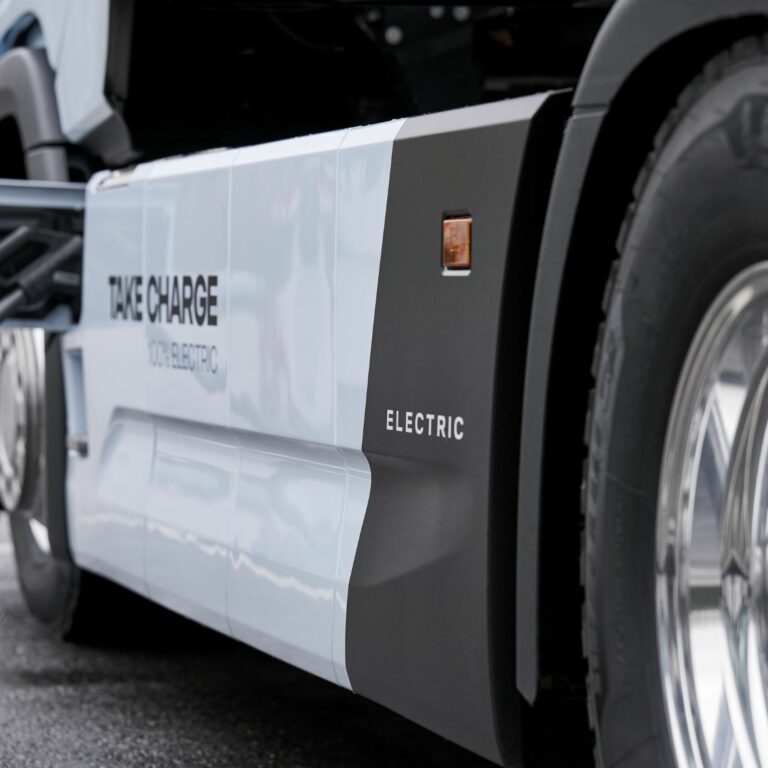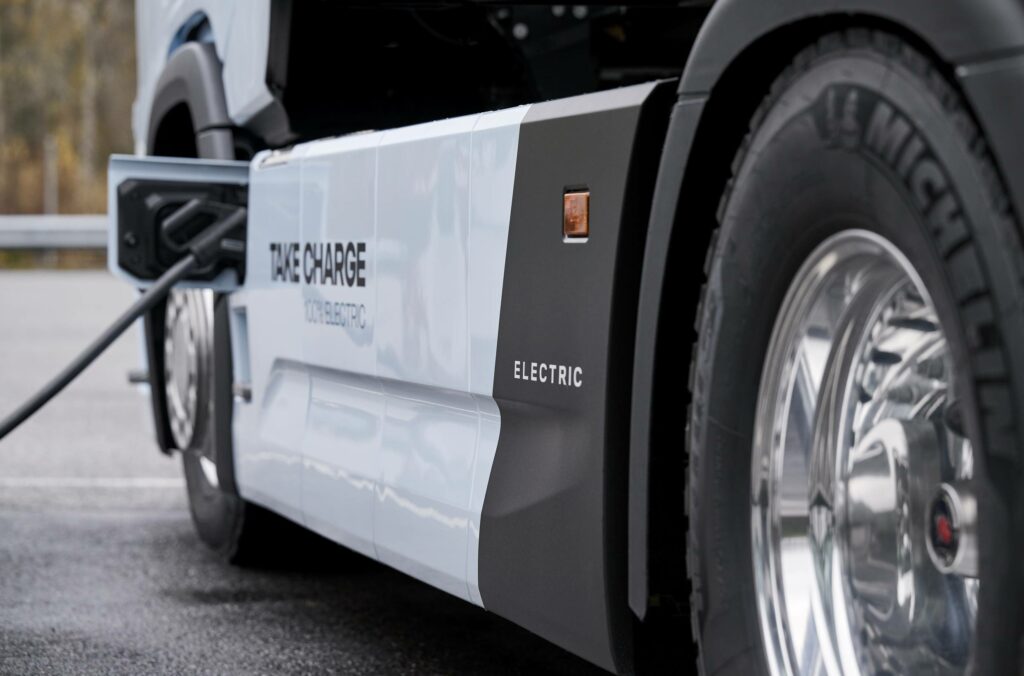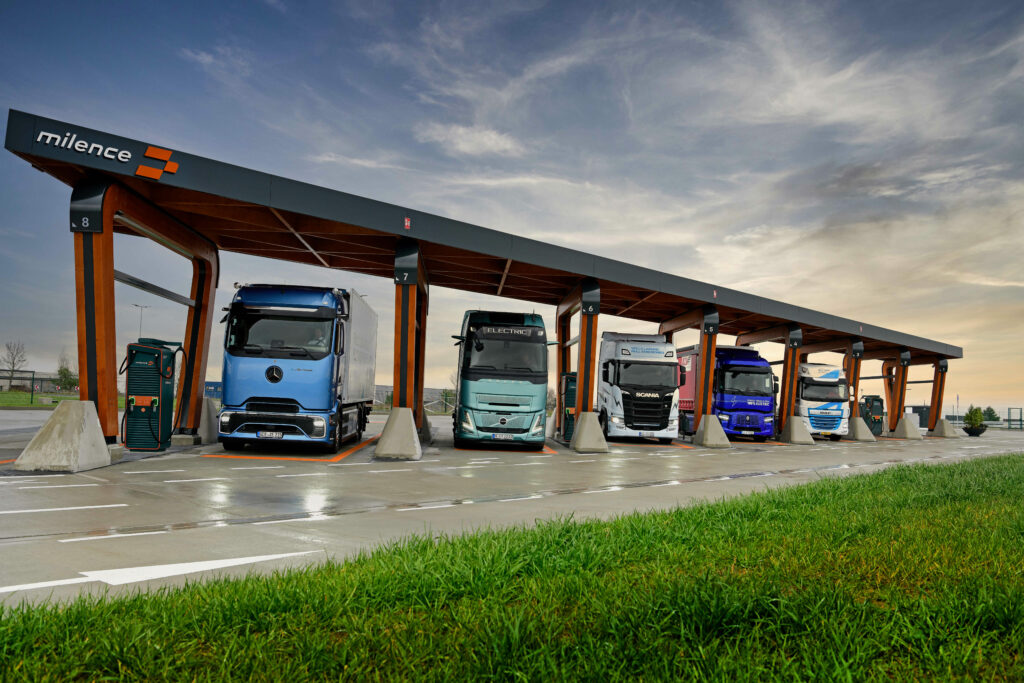We answer some of the most common questions about battery-electric heavy-duty trucks
Around a quarter of the European Union’s road transport emissions come from heavy-duty vehicles, and that share is increasing as transport demand increases and passenger cars go electric. This makes heavy-duty road transport a priority for decarbonising if Europe is to meet its goal to become climate-neutral by 2050.
There are currently two technologies – battery-electric vehicles (BEV) and fuel-cell electric vehicles (FCEV) – expected to make up the majority of Europe’s heavy-duty trucks by 2050. Battery-electric trucks are fitted with large lithium-ion batteries and run on electricity charged from the grid or local energy production. Fuel-cell trucks use hydrogen as fuel. This hydrogen is converted into electricity in the truck’s fuel cell, powering an electric motor or charging an onboard battery. Battery-electric trucks do not have any exhaust, while fuel-cell trucks’ only local waste product is water.
At Milence, our focus is on building the best public charge points for electric trucks, using renewable energy and providing the best rest-and-recharge experience for the driver. We believe battery-electric trucking will play a leading role in the shift to zero-emission transport.
Here are answers to some of the most common questions we get about battery-electric trucking.
I haven’t seen any battery-electric trucks on the highway. Do they even exist?
Battery-electric trucks do exist, and their numbers will grow rapidly in the coming years. Major truck manufacturers are already producing battery-electric trucks for urban and regional transport. Electric passenger cars are already a common sight in many countries, and the same will soon be true for battery-electric heavy-duty trucks.
It is already possible to purchase battery-electric trucks with ranges of up to 300-350 km, suitable for urban distribution and regional haulage. At the IAA Transportation show in Hannover in September 2022, several major manufacturers unveiled or announced long-haul-capable battery-electric trucks, expected on the market in Europe by next year.
How long does it take to charge a battery-electric truck?
Today’s CCS charging standard can, in 90 minutes, charge a 40-tonne truck with enough energy to drive 400 km. With the new Megawatt Charging System (MCS), which will be commercially available soon, such a charge will be possible in 30-45 minutes.
European truck drivers are required to take a 45-minute break every 4.5 hours. This means that, for long-haul applications, a truck can be fully charged while the driver is taking his or her mandatory break.
By combining this ‘break’ charging with regular overnight charging, transport companies will be able to electrify even long-haul transports.
Are battery-electric trucks really greener?
One of the well-known challenges of electric vehicles is the higher carbon emissions from battery production compared with producing an internal combustion engine. A recent study from Scania concluded that an electric distribution truck which drives 500,000 km during its service life has 38 percent less lifecycle emissions than a similar diesel truck. That study used a 2016 EU energy mix baseline. Looking at the expected energy mix in 2030, the figure improves to 63 percent. If powered by only renewable energy, the lifecycle emissions reduction would be as high as 86 percent.
Long-haul electric trucks will have longer service lives than the distribution trucks analysed in this study, meaning the share of lifecycle emissions from production will be even lower in the future. Combining this with an electricity supply that is also becoming more renewable – and greener battery supply chains – lifecycle emissions reductions in the future will be even greater.
Are battery-electric trucks really more efficient?
By storing electrical energy onboard, which is used to directly power an electric motor, battery-electric trucks can achieve a source-to-wheel electrical efficiency of 70-80 percent. That means that only one-fourth of the energy that is produced at the source is lost. The rest is used to propel the truck forward.
This is around 2-3 times more efficient than hydrogen fuel-cell trucks and also significantly better than diesel trucks.
Aren’t battery-electric trucks expensive?
According to our own calculations, long-haul battery-electric trucks will have a lower Total Cost of Ownership (TCO) than diesel trucks starting sometime between 2024 and 2026. This depends a bit on the cost of electricity and the cost of diesel, which can be different depending on location, but battery-electric trucks can already today have a lower TCO than diesel trucks for some urban and regional applications.
Conclusion
In the coming years, battery-electric trucks will prove to be a competitive and efficient choice for transport companies looking to rapidly reduce their climate impact. With the right charging infrastructure in place, battery-electric trucks will be a leading option for many transport applications, including long haulage.



